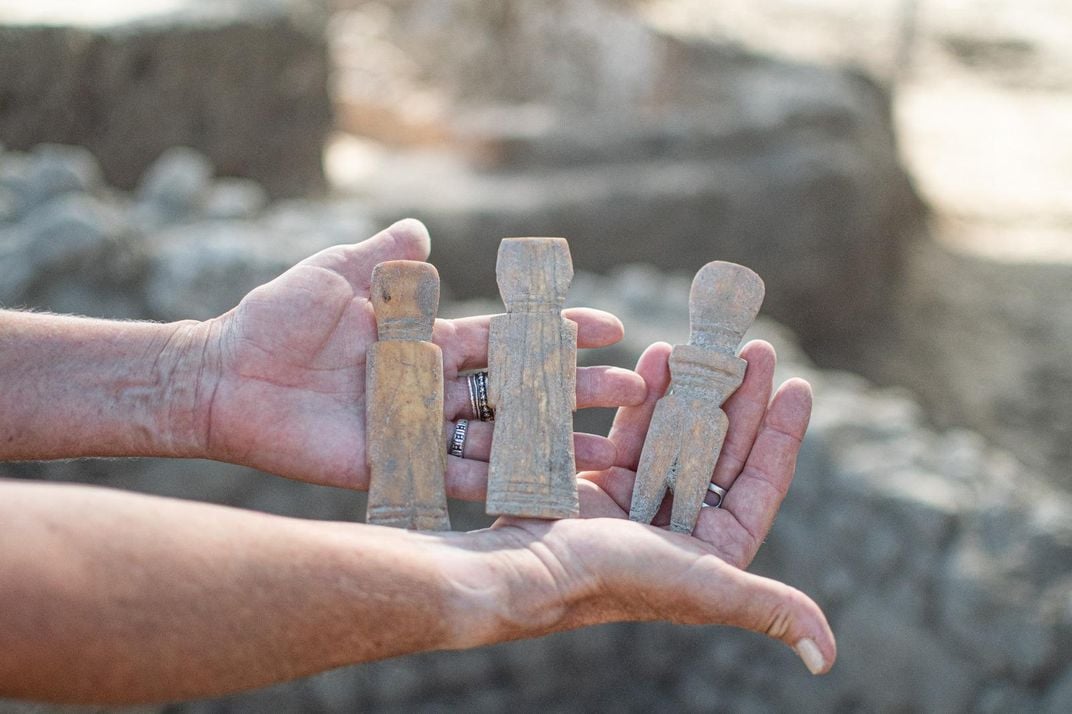Archaeologists Discover—and Crack—an Intact, 1,000-Year-Old Chicken Egg
Human waste in a cesspit in Israel preserved the shell and its contents for a millennium
:focal(746x434:747x435)/https://tf-cmsv2-smithsonianmag-media.s3.amazonaws.com/filer/6d/5a/6d5a51ed-849b-40f5-a6e7-d692ac72bbd1/197344171_645207070210109_3694225127724757413_n.jpeg)
Researchers in Israel have discovered an intact chicken egg laid about 1,000 years ago—though the delicate object cracked in the lab.
“We were astonished to find it,” Alla Nagorsky, an archaeologist with the Israel Antiquities Authority (IAA), tells Haaretz’s Ruth Schuster. “From time to time we find fragments of eggshells, but a whole egg is extraordinary.”
The team discovered the egg in a cesspit in the industrial zone of the ancient city of Yavneh. As Amy Spiro reports for the Times of Israel, the egg remained unbroken for so long because it was pillowed in soft human waste, which created anaerobic, or oxygen-free, conditions and prevented its decay.
“Even today, eggs rarely survive for long in supermarket cartons,” says Nagorsky in a statement. “It’s amazing to think this is a 1,000-year-old find!”
Per the statement, the shell cracked despite staff taking “extreme caution” when removing it from the cesspit under the supervision of an experienced conservationist. Luckily, Ilan Naor, director of the IAA’s Organic Materials Conservation Laboratory, was able to repair the crack. While much of the egg’s contents leaked out, some of the yolk remained, and the researchers preserved it for future DNA analysis.
/https://tf-cmsv2-smithsonianmag-media.s3.amazonaws.com/filer/fc/2b/fc2bd759-2bcc-438d-a32f-18e40ec98047/egg1.jpg)
The discovery was part of an excavation conducted ahead of development of a new neighborhood in the Israeli city. The cesspit also contained three dolls made out of bone—toys typical of the period—and an oil lamp.
Nagorsky tells Haaretz that the team was able to date the finds using the lamp, which was of a type only made in the late Abbasid period. The Abbasid caliphate ruled much of the Middle East from 750 until the Mongol invasion of 1258. It lost control of Jerusalem when Europeans captured the city during the First Crusade in 1099.
Lee Perry Gal, an IAA archaeologist and expert on poultry in the ancient world, tells the Jerusalem Post’s Rossella Tercatin that broken eggshells are relatively common finds during excavations of ancient sites—but discovering a complete egg is extremely unusual.
“Chickens were domesticated in southeast Asia relatively recently, around 6,000 years ago, but it took time for them to enter the human diet,” she says. “They were used for other purposes, such as cockfighting, and they were considered beautiful animals, exhibited in ancient zoos and given as presents to kings.”
Perry Gal adds that one of the earliest known sites with evidence of chicken farming is also located in Israel. People living in Maresha appear to have raised the fowl 2,300 years ago, after Alexander the Great conquered Jerusalem.

In other ancient chicken news, Allison Robicelli of the Takeout reports that researchers examining 3,000-year-old bird bones found in Britain learned that domestic fowl of that time lived, on average, for 2 to 4 years. That’s much longer than the 33- to 81-day lifespan of chickens in modern industrial farming systems. Writing in the International Journal of Osteoarchaeology, the researchers posit that the chickens were used in ritual sacrifices or cockfighting.
“Domestic fowl were introduced in the Iron Age and likely held a special status, where they were viewed as sacred rather than as food,” says lead author Sean Doherty, an archaeologist at the University of Exeter, in a statement. “Most chicken bones show no evidence for butchery, and were buried as complete skeletons rather than with other food waste.”
The findings build on previous evidence suggesting that early cultivation of animals often took place for reasons other than consumption, reported Rory Sullivan for CNN last year.
As Julius Caesar wrote in Commentarii de Bello Gallico, “The Britons consider it contrary to divine law to eat the hare, the chicken or the goose. They raise these, however, for their own amusement or pleasure.”
/https://tf-cmsv2-smithsonianmag-media.s3.amazonaws.com/accounts/headshot/Livia_lg_thumbnail.png)
/https://tf-cmsv2-smithsonianmag-media.s3.amazonaws.com/accounts/headshot/Livia_lg_thumbnail.png)